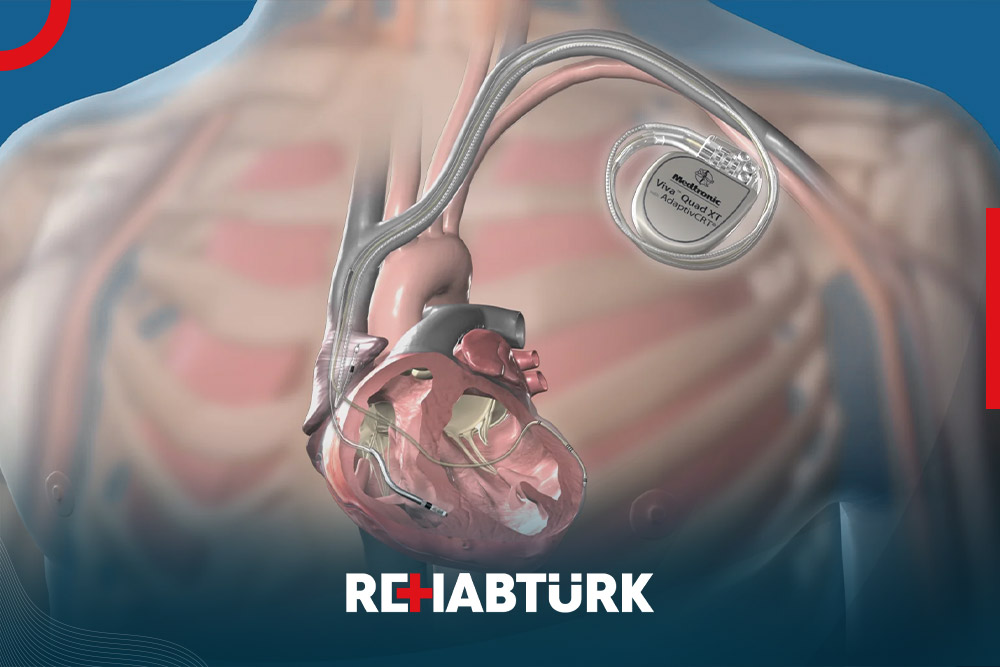Implantation of cardioversion and defibrillation in Türkiye
An ICD cardioverter-defibrillator is a battery-powered device placed under the skin that tracks your heart rate . Thin wires connect the device to your heart. If an abnormal heart rhythm is detected, the device will deliver an electric shock to restore a normal heartbeat if your heart is beating too randomly and too quickly.
Cardiac pacemakers and defibrillators have been very useful in preventing sudden death in patients with known ventricular tachycardia or fibrillation. Studies have shown that it may have a role in preventing cardiac arrest in high-risk patients who do not have ventricular arrhythmias but are at risk of developing it.

The American Heart Association recommends that before a patient can be considered a candidate for cardioverter-defibrillation implantation, the arrhythmia involved must be life-threatening and doctors have ruled out causes to correct the arrhythmia, such as:
- acute myocardial infarction ( heart attack )
- Myocardial ischemia (insufficient blood flow to the heart muscle)
- Electrolyte imbalance and drug toxicity
Because many people do not understand their underlying condition — such as heart failure or a genetic predisposition to risk of sudden cardiac arrest — and because cardioverter-defibrillators are used primarily to prevent sudden cardiac death, they in turn may not understand the benefits versus the limitations of having a defibrillator implanted. Cardiac and defibrillation
Why do I need an ICD cardioverter-defibrillator?
Your doctor may recommend an ICD if you or your child are at risk of life-threatening ventricular arrhythmias because of:
- He was suffering from ventricular arrhythmias
- Have had a heart attack
- I experienced sudden cardiac arrest
- Long QT syndrome
- Brugada syndrome
- A congenital heart disease or other underlying conditions of sudden cardiac arrest
How is a cardioverter defibrillator implanted?
The battery-powered pulse generator is implanted in a pouch under the skin of the chest or abdomen, often just below the collarbone. The generator is about the size of a pocket watch. Leads or wires extend from the pulse generator to positions on or inside the surface of the heart and can be threaded through blood vessels, eliminating the need for open-chest surgery.
How does the device work?
It knows when the heartbeat is abnormal and tries to bring the heartbeat back to normal.
- If your ICD has a pacemaker feature when your heart is beating too slowly, it acts like a pacemaker and sends small electrical signals to your heart.
- When your heart beats too fast or chaotically, it delivers defibrillation shocks to stop the abnormal rhythm.
- It works 24 hours a day.
The new devices also provide an “overdrive” speed to electrically convert persistent ventricular tachycardia (rapid heart rhythm). and the ‘reserve’ pace in case bradycardia (slow heart rhythm) occurs. They also provide a range of other complex functions such as storage of detected arrhythmia events and the ability to perform electrophysiological tests. The information stored can help your doctor improve the orthosis to meet your needs.
What should I ask the doctor about living with a cardioverter-defibrillator?
You can likely resume a semi-normal lifestyle. But it is best to ask your doctor about the types of machines or equipment you should avoid. Also ask what you can and can’t do when you have an ICD.
Suggested questions for the doctor:
- When can I resume normal activities?
- can i swim
- Will I be able to run?
- can i have sex
- Can I play video games and use wireless devices?
- When should I expect a shock?
- Is the shock painful?
recommendation
If you have an ICD, be aware of your surroundings and devices that may interfere with its operation. Potentially disruptive devices include those with strong magnetic fields. The following devices can disrupt ICD signals and prevent them from working properly, sometimes without your knowledge. The longer you are exposed to the device that is potentially disabling you, and the closer it is to your ICD rectifier, the more likely it is to affect the performance of your ICD.
Cardioversion device implantation in Türkiye
The success rate of this operation is high, as it gives the patient comfort and reassurance and keeps him away from the risks of strokes or heart failure.
The medical staff of surgical teams, doctors and consultants in REHABTÜRK can provide the best treatment options and free consultations – by striving to keep abreast of the latest medical technologies and methods.

